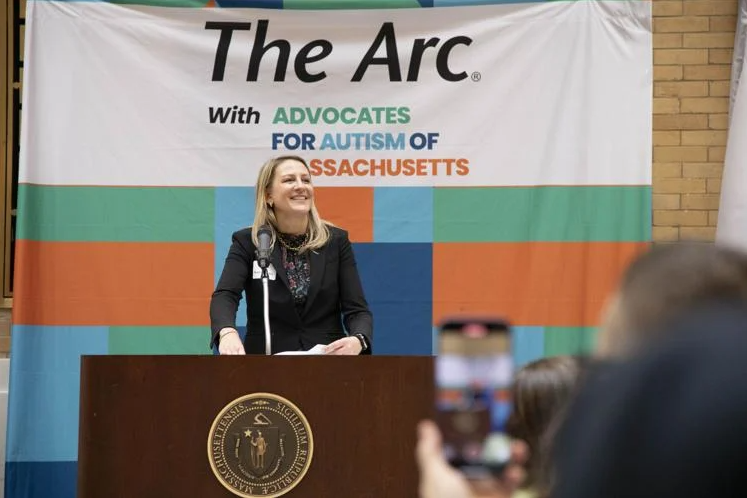A week before House Democrats unveil their annual budget bill, autism advocates stepped up their plea Tuesday for lawmakers to pump more funding into the human services workforce, with the aim of bolstering care for young adults transitioning out of the special education system.
The Turning 22 program, which has its largest class to date and helps young adults move into adult services, features an increasing share of participants on the autism spectrum, said Katie Terino, chair of Advocates for Autism of Massachusetts (AFAM).
In 2019, 27% of Turning 22 participants were autistic, compared to 51% today, Terino said.
“The reality is that many of these young adults aging out of the school system will find themselves on a waitlist or with a reduction in services because we don’t have the capacity to meet their needs,” Terino told hundreds of advocates, individuals with autism and their providers in the Great Hall.
“The increasing prevalence and complexity of autism, and the increasing need for services, brings both challenges and opportunities,” Terino continued. “It requires us to rethink traditional approaches and find innovative solutions. The old way of doing things simply won’t meet the evolving needs of this growing population.”
Terino said AFAM, which functions as a division of The Arc of Massachusetts, is strengthening its collaboration with that larger statewide advocacy organization, which represents 200,000 individuals with intellectual and developmental disabilities and autism, as well as their families.
With the aim of supporting the workforce behind the Turning 22 program, The Arc wants the Legislature to funnel an extra $100 million into the Chapter 257 reserve to modestly raise pay for entry-level direct support professionals. Gov. Maura Healey recommended funding the account at $207 million.
“Please bring the rates of pay to a livable wage for these workers,” Maura Sullivan, CEO of The Arc, said over audience applause. “We need to do this so thousands can come off the waitlist. Whatever goes on federally, the state must invest in the workforce in Turning 22 and in day programs. We need to fortify our programs and services now because we are the most vulnerable to these federal cuts. Lawmakers, please stand with us on this.”
The hourly pay for entry-level workers would increase from $20.79 to $22.35, The Arc said at an event last month.
Amit Basak, the father of identical twin sons who have profound autism, explained the so-called Turning 22 “cliff,” or the “sharp drop-off into uncertainty” when young adults lose access to services and treatment.
“When someone with profound autism turns 22, the services they relied on — school, therapy, specialized programming — come to a screeching halt,” Basak said. “With all due respect to the leaders here, I think our state government has been caught off guard by the increasing complexity and severity of this population. Agencies like DDS, DMH, and MassHealth have overlapping rules, conflicting rules (and) confusing eligibility criteria. We’re also in the staffing crisis.”
When young adults are on the waitlist for services, they can start regressing, Terino said. Parents may also need to scale back going to work to care for their adult children, she said.
“Parents get overwhelmed, and they also can be isolated. Stress, depression, anxiety goes up for the whole family,” Terino told the News Service. “Divorce is not uncommon. Sometimes, you can even see abuse happening in the household because everyone just gets very overwhelmed.”
More than 75,000 Massachusetts residents have autism, said Undersecretary for Human Services Mary McGeown, who acknowledged the waitlists and service gaps Bay Staters are facing. She also presented a proclamation from the governor that recognizes April as Autism Awareness Month.
“News coming out of Washington over the past several weeks have left many of us concerned about how changes at the federal level could impact services for people with disabilities here in Massachusetts,” McGeown said as she invoked MassHealth, which serves more than 2 million Bay Staters, half of whom have disabilities. “We’re carefully looking and analyzing the changing landscape of the federal government.”
Congressional Republicans are eyeing cuts to Medicaid with the aim of tamping down on fraud, waste and abuse. Healey’s budget incorporates $16 billion in federal dollars, with the vast majority tied to Medicaid.
The Arc has been asking members to fill out a community survey to find out the impact of President Donald Trump’s executive orders, as well as to learn how potential service cuts could affect their quality of life. Sullivan signaled The Arc has an ally in Sarah Peterson, who last week was permanently appointed as commissioner of the Department of Development Services.
“We’re super excited,” Sullivan told the News Service. “We know she’s already started to work on some initiatives that really do address profound autism and those with more complex, challenging behavior, along with employment and other initiatives. She’s increased the autism kids waiver.”

